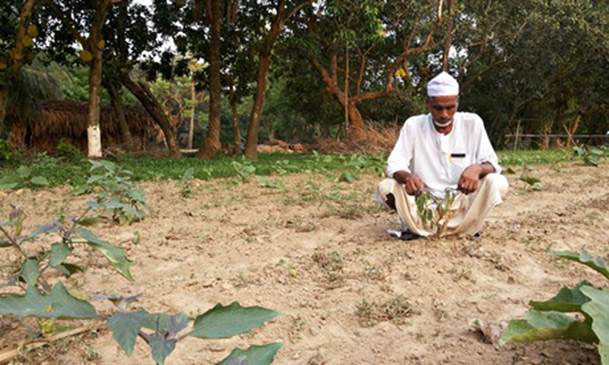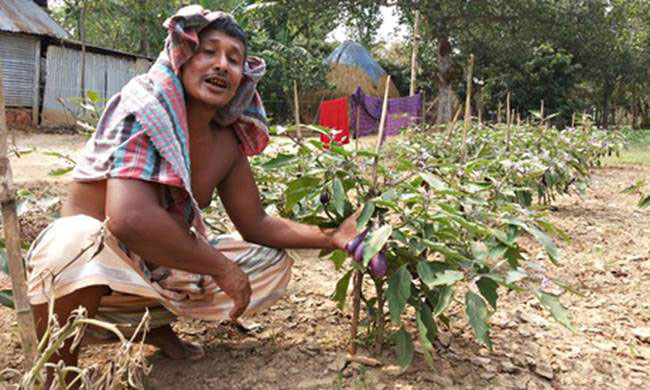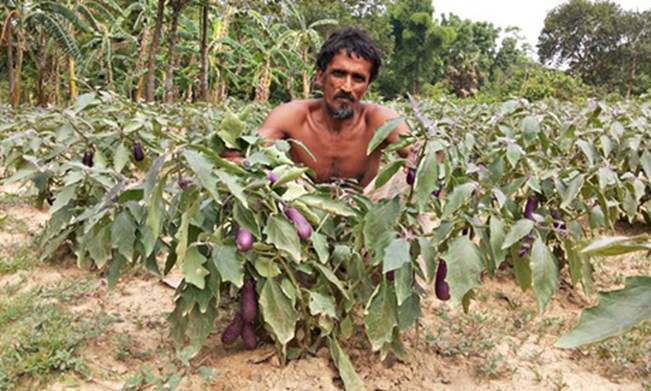Pest infestations, low yields, unwanted produce and unlicensed cultivation as Bt Brinjal is forced on South Asian citizens Dr Eva Sirinathsinghji
A pilot scheme for commercial cultivation of Asia’s first genetically modified (GM) Bt brinjal (eggplant), brought disappointing results for 9 of the 20 farmers, as reported recently in the Guardian newspaper [1]. Four varieties: Kajla, Uttara, Nayantara and ISD006, were planted in different climactic regions. Brinjal is one of Bangladesh’s most important crops both for consumption and export, making its cultivation a huge health and economic risk for the population. Indeed, the region is a centre of origin and genetic diversity for brinjal, and should be protected from genetic contamination as advised under the UN Cartagena Protocol on Biosafety. Its popularity and importance as a food crop makes it a prime target for GM proponents bent in spreading GM technologies to the nation and wider region, including India, where a moratorium is in effect. The Indian moratorium came after fierce opposition from various civil society groups, top scientists, state governments in brinjal growing regions, as well as citizens and environmental groups. The cultivation in Bangladesh has drawn similar controversy, with 100 civil society organisations writing to the country’s Prime Minister Sheikh Hasina in protest (see [2] Don’t Grow Bt Brinjal, SiS 61). The disappointing results will be a setback for those backing the project.
Guardian journalists contacted 19 of the 20 farmers and visited 7, with 9 of them reporting problems that included bacterial wilt and drought, despite the crop’s ability to repel the target pest, the fruit and shoot borer pest. One region, Gazipur, had a failure rate of 4 out of 5 farms, resulting in huge financial losses for the farmers. There has been fierce campaigning by pro-GM groups to conceal these results, accusing anti-GM activists of telling lies about the failure of the crops, but this new report provides detailed information of the farmers and their fields, including photos of dying crops (see figure 1).

Abul Baten's Bt brinjal crop died prematurely, causing huge financial losses

Mojibur Rahmanm, in Gazipur began to get yielding crops, but they then began to die out

Mansur Sarker did gain good yields but is suffering from difficulties in selling the Bt brinjal
Figure 1 Three farmers and their Bt brinjal crops in Bangladesh. Top and middle photos show farmers with failing crops, representing half of the farmers. The rest managed to get yields but are having trouble selling the crop (bottom). Courtesy of the Guardian.com
To add to the controversy, the Bangladesh Agricultural Research Institute (BARI) running the pilot scheme with the support of USAid and Cornell University, appear not to have followed some stipulations of its licence agreement, raising questions over the legality of the scheme. Stipulations included proper labelling, formulation of field production planning, field biosafety management planning, safety measures such as isolation distance management planning, border row management planning and techniques for the protection of local and indigenous varieties and wild plants. BARI admit that they did not visit the fields before planting the crops. Further, reports of improper labelling suggest citizens are completely unaware of what they are buying [3, 4].
The first Bt brinjal was originally developed by Mahyco, an Indian subsidiary of Monsanto, for cultivation in India, but the moratorium prevented commercialisation until an independent regulatory authority was able to carry out its own safety testing [5]. Field trials were halted in the Philippines in 2011 after it had become apparent that researchers had not fully complied with public consultation requirements [6]. Since then, the Bt technology was transferred and extended to local Bangladeshi varieties and approved in 2013 despite being based on the very same safety data provided by Mahyco that India used to reject the crop, with an obvious conflict of interest. Further, the safety tests conducted by Mahyco were limited to 3 months, which clearly cannot provide any insight into any longer term effects that the crop may have. Independent studies on other Bt crops have already revealed toxicity, including immune responses, internal organ damage and respiratory issues (see [7] Ban GMOs Now, Special ISIS report). Previous toxicity tests assessed by Professor Seralini and his team for Greenpeace India on Bt brinjal varieties originally destined for India showed perturbed nutritional content; effects on blood chemistry in rabbits and goats; changes in lactating cows including weight gain, increased milk production and intake of roughage matter, effects on rats including increased water consumption, decreased liver weight, and liver to body weight as well as diarrhoea (see [8] Bt Brinjal Unfit for Human Consumption, SiS 41).
Unfortunately, Bangladesh has a weak biosafety regulatory system and lacks a toxicology lab of its own, making it vulnerable to exploitation by GM corporations and institutions. Cultivation of Bt brinjal in Bangladesh also has implications for bordering nations such as India due to cross-pollination, making genetic contamination a concern not only for Bangladesh. Despite India banning its cultivation, the pilot scheme is taking place in regions bordering the Indian state. As has occurred previously, the illegal spread of GM crops across borders has forced the legalisation of GM crops by nations such as Brazil, due to the difficulty in removing the crops once they have already started growing [9]. This may well happen for India.
Additional debate has centred on the intellectual property rights of the crop, which has been claimed to be freely owned by the Bangladeshi public institutions. However, the Bt technology is still owned by Mahyco Maharashtra Hybrid Seed Company Ltd. (MHSCL). Though the seeds have been freely distributed to farmers during this pilot scheme without royalty fees, there are concerns that intellectual property rights will become an issue in the future. According to the tripartite agreement, known as the Sathguru Agreement signed on 14 March 2005 by BARI, Maharastro Hybrid Seed Company (MAHYCO) and the Sathguru Management consultant Pvt. Ltd., the intellectual property right of the Bt brinjal remains with Monsanto and MAHYCO. In the Agreement, Maharasthra Hybrid Seeds Company Limited is the sub licensor, and BARI is the Sub licensee and a Collaborator in the Agricultural Biotechnology Support Project (ABSP) II project in Bangladesh. Further, if large-scale cultivation is permitted after the pilot scheme, hundreds of local varieties could be developed with the Bt gene to generate further new patentable GM crops [3].
The farmers caught up in a corporate coup on their traditional livelihood are suffering the consequences of a technology that cannot provide long-term success for their farm, health or the surrounding environment. Failure of this pilot scheme may just be a blessing the farmers need to deter them away from such schemes.
Article first published 07/07/14
Comments are now closed for this article
There are 1 comments on this article.
Todd Millions Comment left 8th July 2014 15:03:34
Deterrence may be too late-pollen drift.Even 'sterile' hybrid crops produce reduced levels of viable pollen(usual figure is 2% range)that can be wind blown at least 500 km per growing season,test green houses need venting and there are storms and flooding.Unlimited liability before this toxic trash is developed,is required-which must include the politicians boosting it for post retirement board of director positions and consultancies is needed.